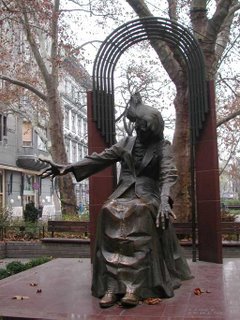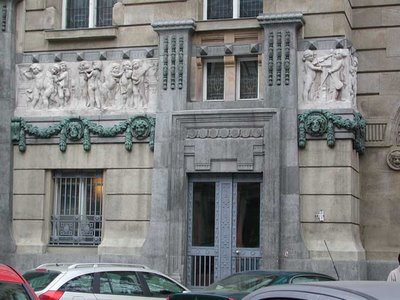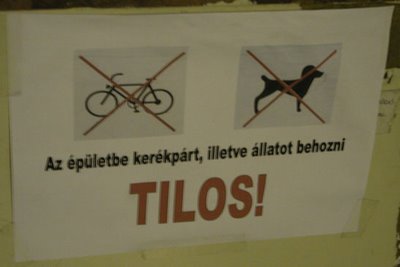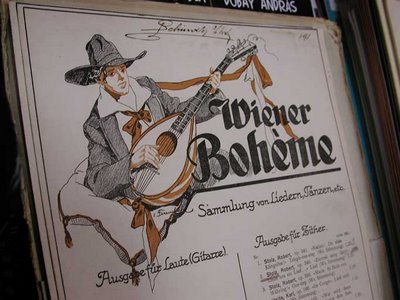Signs of Music in Budapest
 Budapest, like Prague, has a certain awareness of its past and present musical life. And, of course, we were there for musical reasons. This all being the case, we had to go by the statue of Liszt Ferenc (aka Franz Liszt) undergoing an ecstasy of composition. It was something of a challenge to capture the statue's frenzied appearance, and altogether I seem to have failed at that. Whether Liszt actually posed thus, I couldn't say, but as Jesse and I informed our host, Liszt was alleged to get so impassioned in performance that he broke piano strings. After discussing this legend, we are a bit dubious that it can really have been true, as piano strings are pretty tough and Liszt wouldn't have been doing anything more remarkable than banging on the keys. Still, it is one of those tales that every piano student learns early on. I'm not sure I actually aspired to break any piano strings, but I did regard Liszt as a performer to emulate. (This did not, I think, come across to any of my piano teachers.)
Budapest, like Prague, has a certain awareness of its past and present musical life. And, of course, we were there for musical reasons. This all being the case, we had to go by the statue of Liszt Ferenc (aka Franz Liszt) undergoing an ecstasy of composition. It was something of a challenge to capture the statue's frenzied appearance, and altogether I seem to have failed at that. Whether Liszt actually posed thus, I couldn't say, but as Jesse and I informed our host, Liszt was alleged to get so impassioned in performance that he broke piano strings. After discussing this legend, we are a bit dubious that it can really have been true, as piano strings are pretty tough and Liszt wouldn't have been doing anything more remarkable than banging on the keys. Still, it is one of those tales that every piano student learns early on. I'm not sure I actually aspired to break any piano strings, but I did regard Liszt as a performer to emulate. (This did not, I think, come across to any of my piano teachers.)Whether or not Liszt broke his piano strings (and early pianos were probably more in danger of this than today's variety), Budapest's music academy is named after him. It is a large and ornate building.

The interior of the academy is particularly stunning, but after photographing the important sign below, I noticed a different sign forbidding photography.
 I'm not certain why music academies feel it necessary to post signs forbidding bicycles and dogs. Are music students more likely to bring these than other students? Do people (in both Prague and Budapest) typically bring them to concerts? Well, I admit that the Czechs bring their dogs just about everywhere (except for Zlin's 21 building, where they are forbidden). I can't speak for the Hungarians.
I'm not certain why music academies feel it necessary to post signs forbidding bicycles and dogs. Are music students more likely to bring these than other students? Do people (in both Prague and Budapest) typically bring them to concerts? Well, I admit that the Czechs bring their dogs just about everywhere (except for Zlin's 21 building, where they are forbidden). I can't speak for the Hungarians. After dragging ourselves away from the Liszt academy, we visited a cimbalom maker. The store across the street from the workshop has both pianos and cimbaloms, so Jesse tested both the new and renovated variety. There was considerable discussion of the Schunda and Bohak systems and other niceties. Most of the discussion, however, centered on what would be involved in fixing our host's damaged instrument, which was not in perfect shape when bought and which was not improved when some workmen decided to store the bathtub atop it during renovation of the apartment. I'm not certain why the workmen thought the cimbalom was a better place to park the bathtub than the floor; perhaps they had a dislike of cimbalom music.
After dragging ourselves away from the Liszt academy, we visited a cimbalom maker. The store across the street from the workshop has both pianos and cimbaloms, so Jesse tested both the new and renovated variety. There was considerable discussion of the Schunda and Bohak systems and other niceties. Most of the discussion, however, centered on what would be involved in fixing our host's damaged instrument, which was not in perfect shape when bought and which was not improved when some workmen decided to store the bathtub atop it during renovation of the apartment. I'm not certain why the workmen thought the cimbalom was a better place to park the bathtub than the floor; perhaps they had a dislike of cimbalom music.Speaking of cimbalom damage, and for that matter of breaking strings, Jesse revealed that there are legends of cimbalom strings snapping during performance. It is true that violin strings occasionally give way and cause minor mayhem, but a snapped violin string can hardly compare to a snapped cimbalom string, which would be more like a piano string. We had dire visions of cimbaloms crumpling from the stress of the stretched strings and the strings flying out into space. It seemed to us that someone was likely to get killed if this happened, although I do think the performer would have enough warning to step back or even run away.
 After we ran away from the cimbalom workshop, we looked at a lot of books, CDs, and sheet music. Jesse bought a fair amount of sheet music, but restrained himself from getting this item. I really can't see why, although one cannot buy everything...
After we ran away from the cimbalom workshop, we looked at a lot of books, CDs, and sheet music. Jesse bought a fair amount of sheet music, but restrained himself from getting this item. I really can't see why, although one cannot buy everything...And, as a postscript, it must be noted that tonight Hubert is celebrating his imminent departure from the Czech Republic. While I was in Budapest, he SMS'd me asking if he could stay at my place while some sort of renovations were happening in his bedroom, but unfortunately there was no way to whisk the keys back to Prague. I gather that someone painted the room pink and warned that the ceiling might fall in. This could be an exaggeration; I will seek the truth at Hubert's within the hour. However, whatever the state of his bedroom, Hubert departs tomorrow and will take up the peripatic existence of the wandering composer, going from one artists' colony to another. I suppose he will also apply for a few teaching jobs.

0 Comments:
Post a Comment
<< Home